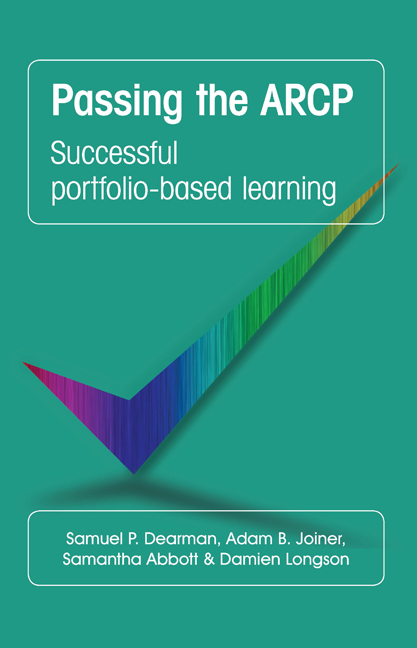Book contents
- Frontmatter
- Contents
- Authors
- List of figures
- Foreword
- Preface
- Acknowledgements
- List of abbreviations
- How to use this guide
- 1 Quick reference guide
- 2 What is a portfolio?
- 3 Lessons learned so far
- 4 Organising the portfolio
- 5 Managing your workplace-based assessments
- 6 Reflective practice and self-appraisal of learning
- 7 Audit and research
- 8 Teaching
- 9 Psychotherapy experience
- 10 Management and leadership experience
- 11 Appraisal reports, planning meetings and educational objectives
- 12 Other experiences, achievements and documents
- 13 The future of portfolios
- Index
3 - Lessons learned so far
- Frontmatter
- Contents
- Authors
- List of figures
- Foreword
- Preface
- Acknowledgements
- List of abbreviations
- How to use this guide
- 1 Quick reference guide
- 2 What is a portfolio?
- 3 Lessons learned so far
- 4 Organising the portfolio
- 5 Managing your workplace-based assessments
- 6 Reflective practice and self-appraisal of learning
- 7 Audit and research
- 8 Teaching
- 9 Psychotherapy experience
- 10 Management and leadership experience
- 11 Appraisal reports, planning meetings and educational objectives
- 12 Other experiences, achievements and documents
- 13 The future of portfolios
- Index
Summary
The intention of this chapter is to capture the common questions and concerns raised by psychiatric trainees about portfolio-based learning in psychiatric training. Because of the often subtle answers to such questions, a structured, real question-and-answer format has been adopted. What follows is a transcript of a discussion about portfolio-based learning in psychiatric training, with Dr Samuel Dearman (S.D.) leading with questions from his position as a senior psychiatric trainee, Dr Damien Longson (D.L.) as an ARCP panel chair and Mrs Samantha Abbott (S.A.) as the head administrator of a medical education department. By reading this transcript, you should get a better understanding of why a portfolio is used, how to use it and how much to put in it, how the ARCP panel will judge your portfolio, as well as gaining improved understanding of the use of WPBAs, reflection, and meeting management and research competencies.
The developmental portfolio
S.D.: If we look at the portfolio itself as a place to start with, could you briefly describe what you think the portfolio needs to be from the position of the school of psychiatry, from an ARCP panel but also speaking as a trainer?
D.L.: It is a document owned by trainees, one of many they will have through their professional careers. What the panel really are trying to see is not whether trainees are developing habits that are going to become lifelong, but the way they learn, reflect and document things, and the way they drive their own personal development. It is a tool for the ARCP to use to make sure the individual develops properly. What the ARCP panel looks for is demonstration of that style of thinking. If there are serious deficiencies in terms of learning outcomes or things just have not been done at all, then clearly that's an issue and at the end of the day the curriculum requirements have to be met. We would be a lot more comfortable knowing that somebody is going to be a safe doctor for the next 20 or 30 years if their portfolio demonstrates the learning cycle. If the portfolio just demonstrates log book functions and no reflective processing, then we would be worried and would scrutinise more closely. But if overall it is a well-developed portfolio – well triangulated, well reflected – we will think, ‘This is an adult learner, we are happy’.
- Type
- Chapter
- Information
- Passing the ARCPSuccessful Portfolio-Based Learning, pp. 12 - 23Publisher: Royal College of PsychiatristsFirst published in: 2017



